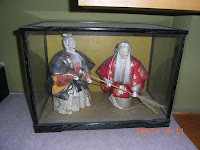
I took a picture of this in my house. This space is called “Tokonoma”, where is adorned with “Kakejiku” (hanging scroll), “Okimono” (ornament), “Kabin” (vase) and so on. “Tokonoma” is usually set in Japanese-style room and one step higher up.
This space isn’t needed to live, but even now it is built in Tatami room, especially in detached house. I think this symbolizes Japanese mind which cherishes traditions and flavor.
I’m interested in whether there are spaces like this in others countries or not.

This is called “Takasago Ningyo(doll) ”, which hopes well-rounded husband and wife and long life.
There are many things like this in Japan, but actually I didn’t know that meaning until the day when I heard it from my mother. In other word, until the day I made this blog.
It may be too much to say with only my case, but the fact I didn’t know it could be due to multicultural Japanese society because I think there are any cultural things in Japan and those things deadens interest about home country.







